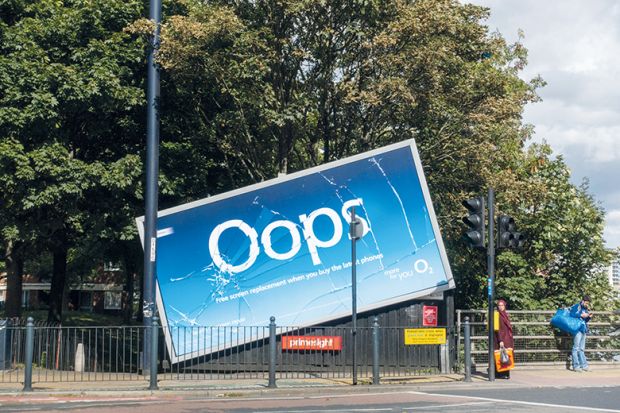Universities have inherited more respect than they deserve. Scandals occasionally erupt about incompetent or spendthrift leaders, bribes for admission and corrupt athletics programmes – especially in the United States – but higher education has usually been spared broader investigation by journalists, academics and governments.
Jason Brennan (professor of strategy, economics, ethics and public policy at Georgetown University) and Phillip Magness (a senior research fellow at the American Institute for Economic Research) try to step into this gap with their new book. They have searched far and wide for immorality at universities and reported their findings. The search is revealing at times and at other times strained, with the authors taking swipes at aspects of university life they and others may well dislike – rewarding professors for research rather than teaching, for instance – but which aren’t unethical.
They are particularly incensed about what they call “negligent advertising”, or the habit of many universities to claim that they can transform their students’ intellectual abilities. As the relatively recent political movement to make universities “accountable” discovered, evidence that students’ time at universities produces such changes is weak. Brennan and Magness hold up the liberal arts for particular scorn in claiming to teach “soft skills” without ever proving it. They concede that marketers believe their own assertions but take them to task for not checking them out.
The authors also examine evaluations of professors and conclude that they measure student satisfaction but not teaching effectiveness. Thus, the more an institution relies on such evaluations, they say, the more immoral it is. Administrators fail to check the evidence that student evaluations tell us little about teaching and use them to wield power over faculty members. Brennan and Magness’ review of the scientific literature about student evaluations seems thorough. Their conclusion that some administrative jobs depend on using such reviews is shaky.
The reality is that there is a much better question about student evaluations than whether their use is moral or immoral: namely, can they be improved or better deployed? If we put ourselves in administrators’ shoes, what would we do?
The morality framework of the book falls apart even more when the authors turn to the topic of grades. They take apart how professors grade papers and exams, and how they add up the components of a course – tests, papers, quizzes – to come up with a final grade. There are no surprises here and they conclude that the process is imprecise. This time, though, they largely leave out the moral framework.
Yet Brennan and Magness go on to apply their moral magnifying glass to student cheating, the professorial habit of cloaking advocacy for themselves within the language of ethics, the tendency of universities to crank out students with PhDs in unemployable disciplines and other unattractive features of university life. In the end, the book offers a relatively novel catalogue of university weaknesses, viewed through one particular lens, although the authors throw up their hands when it comes to solutions.
David L. Wheeler is the editor of Al-Fanar Media, which focuses on higher education in the Arab world, and a former managing editor of the Chronicle of Higher Education.
Cracks in the Ivory Tower: The Moral Mess of Higher Education
By Jason Brennan and Phillip Magness
Oxford University Press, 336pp, £19.99
ISBN 9780190846282
Published 1 May 2019
后记
Print headline: Searching for immorality




